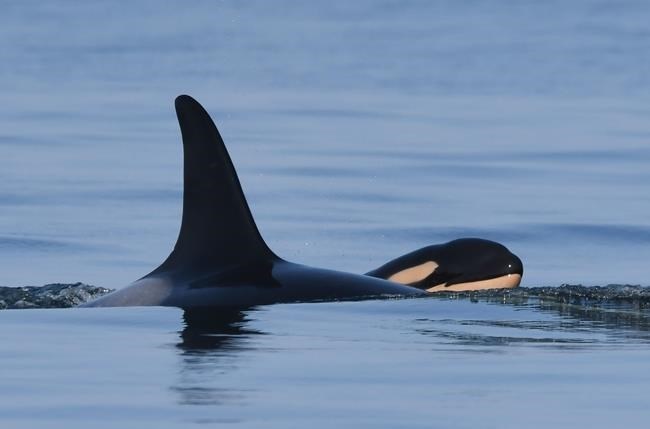
The orca mother that sparked international headlines by carrying her dead calf for 17 days in waters off the Pacific Northwest coast in 2018 has given birth again. The Centre for Whale Research says a new calf was spotted on Sept. 5 with a pod of endangered southern resident killer whales and the mother has been identified as J35, or Tahlequah, shown in a handout photo.
Image Credit: THE CANADIAN PRESS/HO/Katie Jones, Center for Whale Research
September 24, 2020 - 12:03 PM
FRIDAY HARBOR, Wash. - Whale watchers in Washington state say they've determined the sex of the new addition to a critically endangered pod of killer whales.
A social media post by the Center for Whale Research says pictures of the roughly three-week-old southern resident killer whale calf confirm it's a male.
The post says the calf, officially named J57, was spotted Tuesday in waters just south of the Canadian border, rolling, lifting his head and upper body clear of the water and swimming beside his mother, J35.
As he rolled on his back, researchers snapped a photo confirming the sex.
The post also says J57 is robust and appears healthy.
The calf's mother gained international attention after giving birth in 2018 because that calf died soon after and she pushed it along the surface of the water for more than two weeks in an effort to revive it.
The centre says just over 70 southern resident orcas remain in the wild and female calves are preferred for population sustainability, but they also say J57 is still a welcome addition to the struggling species.
Researchers are watching J57 carefully because the mortality rate for calves is about 40 per cent, mainly due to recent declines in the pod's preferred food of chinook salmon.
The latest post says J57's mother was actively foraging when the pictures of her calf were snapped but concern remains because the centre says salmon migrations to spawning grounds up the Fraser River have been so poor this year that the whales have rarely ventured into what is usually their core habitat in the Salish Sea.
This report by The Canadian Press was first published Sept. 24, 2020.
News from © The Canadian Press, 2020